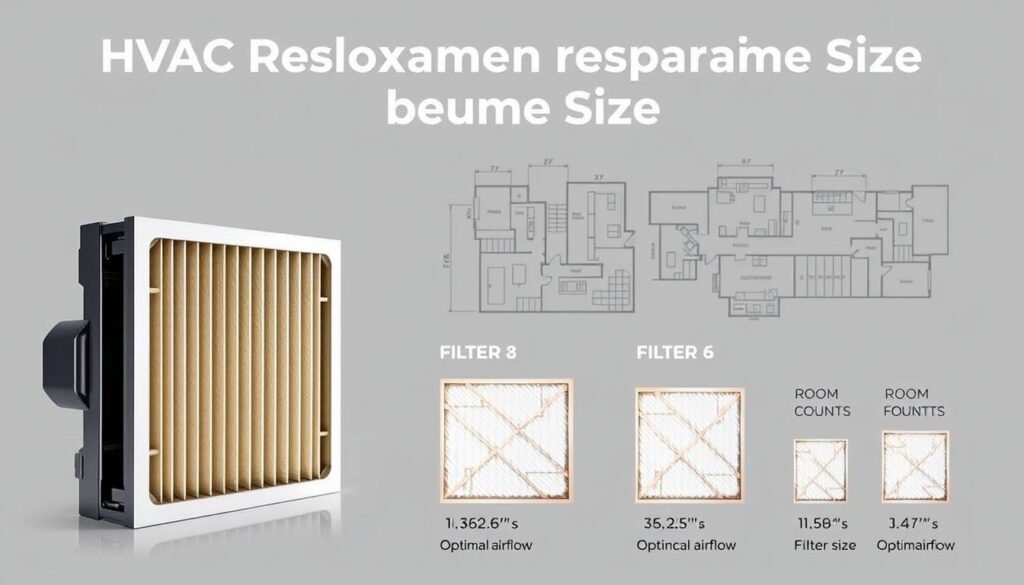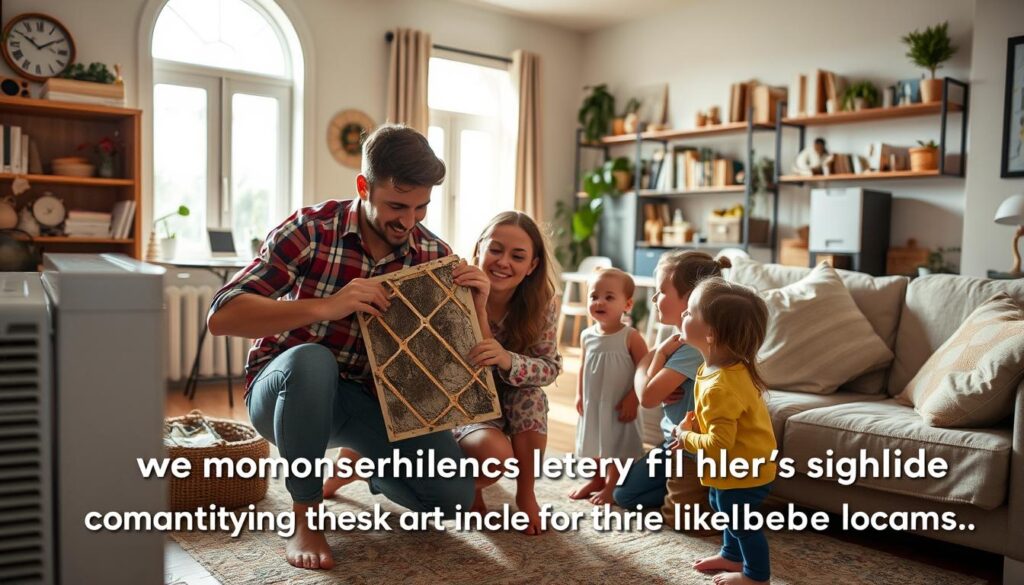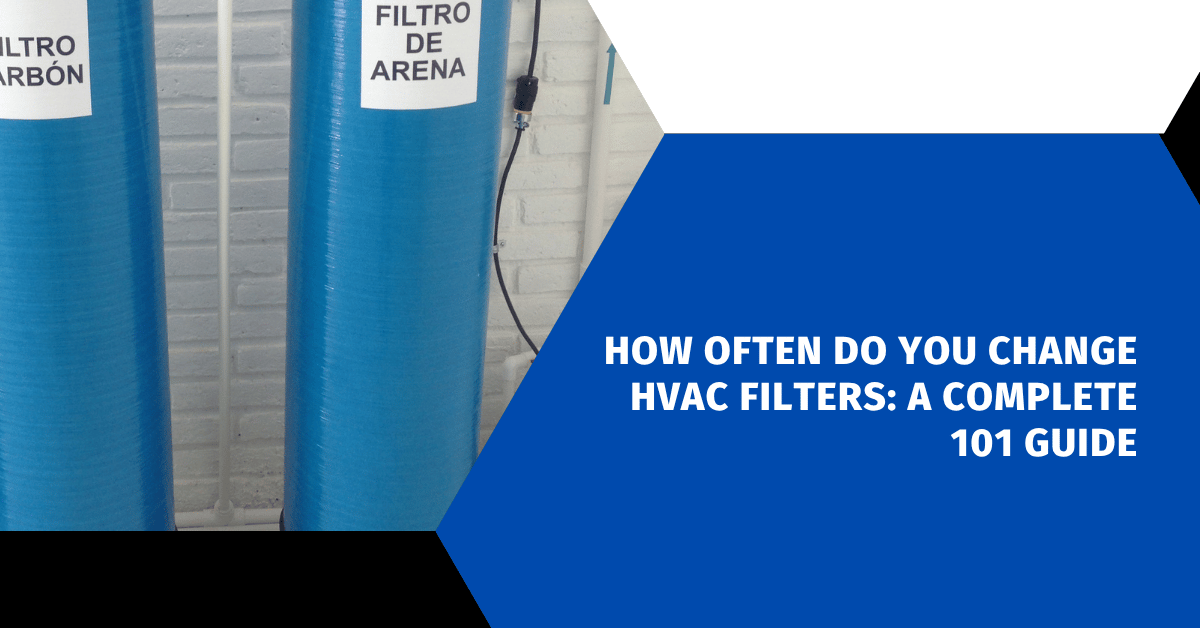Affiliate Disclosure
HVAC Guide Guys is a participant in the Amazon Services LLC Associates Program, an affiliate advertising program designed to provide a means for sites to earn advertising fees by advertising and linking to Amazon.
How Often Do You Change HVAC Filters? Did you know that ignoring your HVAC filter can hurt your energy efficiency and air quality? Knowing when to change your HVAC filters is key to a healthy home. It also protects your heating and cooling system.

HVAC filters catch dust, allergens, and particles in your home. How often you need to replace them depends on your home’s environment, how much you use your system, and the type of filter.
Keeping your filters clean boosts your system’s performance and saves energy. It also improves the air you breathe. By changing filters regularly, you avoid breakdowns and keep your home comfortable and clean.
Key Takeaways
- Regular HVAC filter changes are essential for system efficiency
- Filter replacement frequency varies based on household conditions
- Clean filters improve air quality and reduce energy costs
- Different filter types have unique maintenance requirements
- Professional recommendations can guide your filter maintenance schedule
Table of Contents
Understanding HVAC Filter Basics and Their Importance
Your home’s HVAC system needs filters to keep the air clean and healthy. These filters are key to keeping your home safe and your system running well.
HVAC filters catch dust, allergens, and other particles in your home’s air. Keeping them clean is important for your health and your HVAC system’s life.
What Are HVAC Filters?
HVAC filters are special screens in your heating and cooling system. They come in different types and materials, each with its own features:
- Fiberglass filters
- Pleated filters
- Washable filters
- High-efficiency particulate air (HEPA) filters
Why Regular Filter Changes Matter
Following indoor air quality guidelines means keeping your filters clean. Dirty filters can:
- Reduce air flow
- Make your system use more energy
- Lower your system’s efficiency
- Make the air in your home less clean
Impact on Energy Efficiency
The Department of Energy says changing a dirty filter can boost your system’s efficiency by 5-15%. Regular filter changes are not just about clean air—they’re about protecting your investment and saving on energy costs.
Clean filters mean a healthier home and a more efficient HVAC system.
Types of HVAC Filters and Their Lifespans
Choosing the right HVAC filter is key to keeping your home’s air clean. Different filters have their own benefits and need special care to last longer.
Fiberglass Air Filters
Fiberglass filters are the cheapest option for homeowners. They are thin and disposable, lasting about 30 days or less. They catch big dust particles but not the small ones.
- Lowest cost filter option
- Least effective at trapping small particles
- Recommended replacement every 30 days
Pleated Air Filters
Pleated air filters are better at catching particles than fiberglass ones. They have a special design that traps more airborne particles. They can last up to 90 days, depending on your home’s air quality and how much you use it.
- More efficient particle capture
- Higher MERV ratings available
- Extended residential hvac filter lifespan
Washable Air Filters
Washable filters are good for the environment. They can last years, but need to be cleaned every month to work well. Keeping them clean is important for their performance.
- Reusable and environmentally friendly
- Requires consistent monthly cleaning
- Can be cost-effective long-term
Explore Our HVAC Shop
Looking for top-rated HVAC tools, parts, and accessories? Visit our shop and find the perfect solution for your needs.
Visit the ShopHow Often Do You Change HVAC Filters: Key Determining Factors
Figuring out how often to change your HVAC filters isn’t simple. Many things affect how often you need to replace your furnace filter. Your home’s unique features are key in finding the best filter change schedule.
Several important factors influence your filter maintenance routine:
- Air Quality: Indoor and outdoor pollution levels significantly affect filter lifespan
- Home Environment: Presence of pets, dust, and allergens accelerate filter wear
- System Usage: Frequency and intensity of HVAC system operation
- Filter Type: Different filters have varying durability and performance
Your living situation greatly affects how often you need to change filters. Homes with pets or allergies might need more frequent changes. Experts usually suggest changing filters every 60-90 days, but this can change based on your situation.
Professional HVAC technicians recommend monitoring your filter’s condition regularly and adjusting replacement intervals.
To get the best advice, track your filter’s performance. Also, talk to a local HVAC expert who knows your home and system needs.
Impact of Home Size and System Usage on Filter Replacement
Your HVAC system’s filter replacement schedule isn’t one-size-fits-all. The size of your home and how you use your system play key roles. Understanding these factors helps keep your air quality and system efficiency top-notch.

Different home sizes and usage patterns affect filter maintenance needs. Let’s explore the main factors that influence your commercial hvac filter recommendations:
Square Footage Dynamics
Larger homes need more frequent filter changes because of more air circulation. The bigger your home, the harder your HVAC system works. This is to keep the temperature and air quality consistent.
- Small homes (under 1,000 sq ft): Change filters every 3-4 months
- Medium homes (1,000-2,500 sq ft): Change filters every 2-3 months
- Large homes (over 2,500 sq ft): Change filters every 1-2 months
Seasonal Usage Patterns
Your filter replacement frequency changes with the seasons. In peak heating and cooling months, your system works harder. This means you might need to change filters more often.
Vacation Homes vs Primary Residences
Vacation properties have special filter maintenance needs. Infrequently used homes might need less frequent filter changes. But, don’t forget regular maintenance. Dust and moisture can build up even when no one is there.
Pro tip: Consider using high-quality filters with longer lifespans for vacation homes to reduce maintenance frequency.
Explore Our HVAC Shop
Looking for top-rated HVAC tools, parts, and accessories? Visit our shop and find the perfect solution for your needs.
Visit the ShopIndoor and Outdoor Air Quality Considerations
Your home’s air quality is key to knowing when to change HVAC filters. Both indoor and outdoor factors can affect how well filters work and last.
Outdoor pollutants are a big challenge for indoor air quality. Places with lots of pollution, wildfire smoke, or pollen can make filters less effective. Cities and areas with factories need filters changed more often.
- Wildfire smoke particles quickly clog filters
- Pollen and urban pollution increase filter maintenance needs
- Seasonal changes affect air quality and filter performance
Indoor activities also play a big role in HVAC filter care. Cooking, smoking, burning candles, and using fireplaces release tiny particles that get trapped in filters. Homes where people cook a lot or smoke indoors might need filters changed every 30-45 days, not the usual 90 days.
| Indoor Activity | Filter Impact | Recommended Replacement Frequency |
|---|---|---|
| Regular Cooking | High Particle Generation | Every 45-60 Days |
| Indoor Smoking | Extreme Particle Accumulation | Every 30-45 Days |
| Pet Presence | Moderate Particle Generation | Every 60-90 Days |
“Clean air starts with understanding your environment and maintaining your HVAC system proactively.” – HVAC Maintenance Experts
Watching your home’s air quality helps you make a plan for filter care. By paying attention to your environment, you can keep your air and system working well.
The Role of Household Occupants in Filter Maintenance
Your household’s size and type greatly affect how often you need to change your HVAC filters. Different family setups mean different needs for keeping your filters clean.

Families with Children
Children are more sensitive to indoor air quality. This makes keeping filters clean very important. Young immune systems can be greatly affected by dust and other particles in the air.
Families with kids should:
- Check filters every 60-90 days
- Use higher-efficiency filters
- Watch for more dust and allergens
Pet Owners’ Special Considerations
If you have pets, your HVAC filter will get dirty faster. The size, number, and hair length of your pets affect how often you need to change the filter.
- Homes with many pets might need filter changes every 30-45 days
- Think about using MERV 11 or 13 filters for better pet hair capture
- Regular pet grooming can help keep filters cleaner
Allergy and Asthma Sufferers
For people with allergies or asthma, keeping filters clean is a must. Choosing the right filter can greatly improve air quality and help manage symptoms.
- Go for HEPA-rated filters for the best particle capture
- Change filters more often – maybe every 30-60 days
- Talk to an HVAC expert for advice tailored to your needs
Signs It’s Time to Replace Your HVAC Filter
Knowing when to replace your HVAC filter is key for good air quality and system performance. The right time for a filter change varies. Your home’s conditions are important in deciding when to replace it.
Start by checking your filter visually. Here are signs it’s time for a new one:
- Visible Dirt Accumulation: A dirty filter looks gray or dark with debris, it’s time for a new one
- Reduced Airflow from Vents: Weak air means your filter is clogged
- Increased Energy Bills: A dirty filter makes your HVAC work harder, raising bills
- Dusty Home Surfaces: Too much dust around vents and furniture means your filter isn’t working well
Try the light test to check your filter. Hold it up to a light. If light barely gets through, it’s time for a new one. This simple test keeps your HVAC system running well and air clean.
Most filters need to be replaced every 60-90 days. But homes with pets, smokers, or allergies might need more frequent changes. Watch your system’s performance and look for visual signs to find the best time to replace your filter.
Explore Our HVAC Shop
Looking for top-rated HVAC tools, parts, and accessories? Visit our shop and find the perfect solution for your needs.
Visit the ShopProfessional Recommendations for Filter Maintenance
Maintaining your HVAC system is key. Professional HVAC technicians share important tips on filter care. These tips can make your system last longer and improve air quality indoors.
MERV Ratings Guide
Knowing about MERV (Minimum Efficiency Reporting Value) ratings is vital. These ratings go from 1 to 16. Higher numbers mean better filtration.
| MERV Rating | Filtration Level | Recommended Use |
|---|---|---|
| 1-4 | Basic Filtration | Residential basic needs |
| 5-8 | Medium Filtration | Improved residential air quality |
| 9-12 | High Efficiency | Commercial spaces, allergy sufferers |
| 13-16 | Maximum Filtration | Hospitals, clean rooms |
Manufacturer Guidelines
Always check your HVAC system’s manual for filter replacement tips. Manufacturers give specific advice for your model.
Expert Maintenance Tips
- Check filters monthly for visible dirt and debris
- Replace filters every 90 days in standard environments
- Use high-quality filters matching your system’s specifications
- Schedule professional HVAC maintenance annually
Pro tip: Set digital reminders for filter replacement to maintain optimal system performance and air quality.
Conclusion
Knowing when to change your HVAC filters is key to a healthy home. The frequency of replacement affects air quality, energy use, and your system’s performance. By considering your home’s size, how many people live there, and the air quality, you can create a maintenance plan that works for you.
Filter care is more than just home upkeep. It’s an investment in your family’s comfort and health. Every home is different, so finding the right filter change schedule is important. This can greatly improve your indoor air and extend your system’s life, whether you have pets, allergies, or live in a dusty area.
Start by checking your filter’s condition every month. Keep track of when you need to replace it and follow your HVAC system’s guidelines. Making small, consistent efforts can save you money and keep your home comfortable and clean.
Remember, taking care of your filters is about more than just replacing them. It’s about keeping your home’s air clean and your family healthy. Start making these changes today and see how it improves your home’s comfort and your HVAC system’s performance.

